VIVA
VIVALDI CONCERT SHOWCASES TOP MUSICIANS
June 21st, Bourgie Hall
Elizabeth
Wallfisch leads the way with exciting string ensemble
There
were some vigorous Vivaldi moments in this concert -- enough
to make up for a few glitches, including the Therbo (lute) that
seemed to crack a string or something, but once quickly adjusted
by its wonderful player, Sylvan Bergeron, and upon the suggestion
of Ms. Wallfisch, that Adagio movement was repeated. As well,
there seemed to be an out-of-tune high treble note on the harpsichord
that kept coming into play as Hank Knox performed Bach’s
Concerto No. 9 in D major. I could hear a few violins
squeak at times, yet all in all, Vivaldi’s L’Estro
Armonica was a delight to listen to.
Ms.
Walfisch is an impeccable master of ornamental playing which
characterizes the Baroque of Vivaldi. Her ensemble was a gathering
of Canada’s winners -- those who compete every three years
for the chance to borrow fine stringed instruments from the
Canada Council’s Musical Instrument Bank. Mr Brott played
a key role in setting up this Bank and along with W.I.M. Turner,
raised funds to purchase a 1706 Turner-Brott Tecchler cello,
which is on a career loan to Mr. Brott.
Lively,
languid, sorrowful and sensational, the overall performance
of the artists showed impeccable passion and timing. I particularly
enjoyed the violin playing of Iryna Krechkovsky who was given
the solo-like role in Vivaldi’s highly difficult Concerto
in E major No 12, Opus 3 of the L’Estro Armonico
- one of the five of the concertos featured in the afternoon
performance.
In all the Presto and Largo movements; Vivaldi and the orchestra
really became one. Vivaldi is always such a golden pleasure
to listen to and the century-old baroque instruments offered
a splendid treat.
This
was the final concert of the Montreal Chamber Music Festival
– a fitting performance that embodied the energetic spirit
of this wonderful Festival.
MARIE-JOSÉE
LORD DELIVERS A STUNNING VOCAL PERFORMANCE
June 19th, Bourgie Hall
Emotional
brilliance, humour, tragedy and coquettish whimsy -- all were
captured in the remarkable voice of Marie-Josée Lord
in her special concert, called Femmes. From the get-go, Ms.
Lord explained that her concert would take us on an emotional
voyage traveling 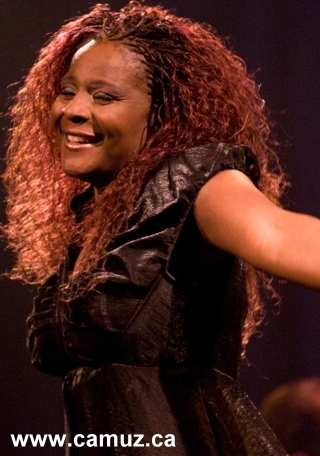 through
the feminine terrain. She thematically addressed these themes
in the pieces she sang: love, loss, ageing, and madness --“la
folie.”
through
the feminine terrain. She thematically addressed these themes
in the pieces she sang: love, loss, ageing, and madness --“la
folie.”
Ms.
Lord was wonderfully lively, and as she explained the plot context
of each song, we were not only treated to the opera side of
things, but the story side as well. She is a supremely gifted
artist who thoroughly captivates with her infectious personality
and totally disarming manner. She takes any trace of stuffiness
out of opera. Backed by three female string players and a pianist,
they beautifully enhanced Ms. Lord’s glorious voice.
The
countess from Figaro, Salome, Thaïs, Sister Angelica and
more characters came to life as she sang key arias and moments
in operas that vividly revealed women at the peak of their emotional
joy and deepest valley of despair. Her most moving moments came
when she sang the iconic Madame Butterfly aria, and when she
sang Strauss’s macabre Salome in the scene when John the
Baptist’s head is presented to this mad, manic woman.
Her final piece, Massenet’s “Dis-moi que je suis
belle eternellement,” was extraordinary. The very loud
high last note was a tour de force that demonstrated Ms. Lord
comes by her last name honestly; I have never heard such power.
Her
technique allows her to soar to ragingly high registers and
plummet into deep earthy tones. From the flirtatious to the
frightening, we met many characters; the songs presented by
Ms. Lord highlighted strong women who confront the divine and
demonic in themselves. We were thrilled to hear how powerful
and complex women in opera are. The composers -- all male surely
grasped the many facets of the feminine.
Her
encore gave us Gilbert Becaud’s famous “Maintenant,”
a song about losing everyone; nothing is left to live for. This
concert was outstanding; Ms. Lord made us all feel we have everything
to live for -- even though being a woman is not always easy.
RACHEL
BARTON PINE SPELLBINDS AUDIENCE IN PAGANINI PERFORMANCE
June 16th, 8:00 p.m, Bourgie Hall
Violinist
extraordinaire, Rachel Barton Pine proved to the audience that
Paganini may have met his match last night. She dared to 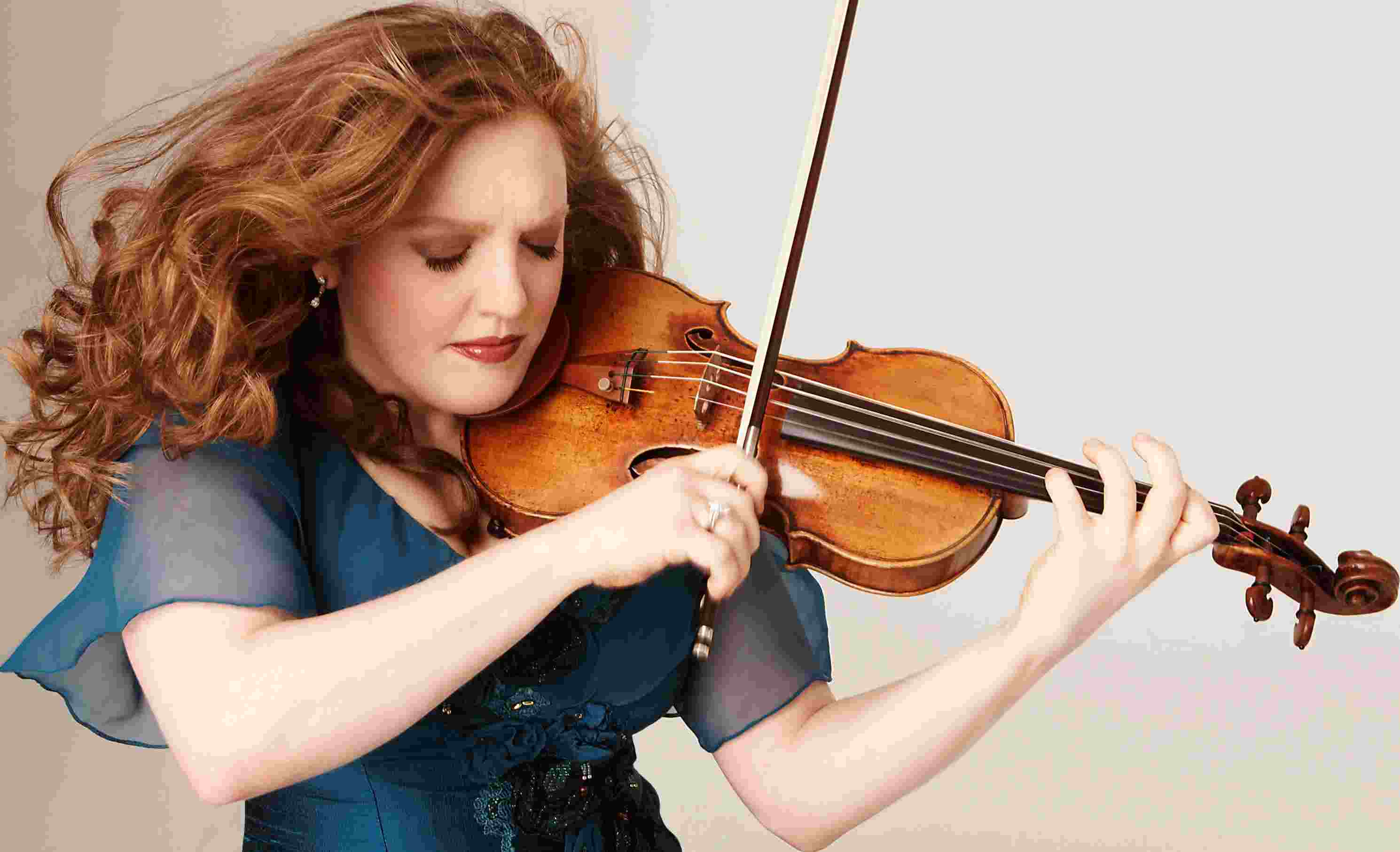 perform
all “24 Caprices” -- a dazzling collection 'construed'
with musical import and effect by the composer some called the
devil due to his mesmerizing technical virtuosity and innovations
with violin adjustments and sounds -- not to mention the hypnotic
grip of his gaze that transfixed those that met him.
perform
all “24 Caprices” -- a dazzling collection 'construed'
with musical import and effect by the composer some called the
devil due to his mesmerizing technical virtuosity and innovations
with violin adjustments and sounds -- not to mention the hypnotic
grip of his gaze that transfixed those that met him.
Paganini
suffered from a disease known as spider fingers that produces
elongated ligaments; this surely accounted for his preposterously
difficult-to perform compositions. Yet, Ms. Pine performed the
pieces with delightful dash and devotion while exuding warmth,
passion and humour, too. This, she accomplished -- producing
faster-than-the speed-of sound clarity, and impeccable timing
coloured with tonal contrasts -- without being cursed by the
spider finger affliction that ironically benefitted Paganini
as composer/performer until the illness completely destroyed
his entire body.
Ms. Pine was more than able to pull off every staggering stretch
of the fingers on the strings of the violin’s neck with
impeccable polish and feeling. Her technique left us breathless
and her glowing musicality moved us with awe.
She not only played each of these impossible pieces perfectly,
but entertained us as she explained different violin applications
and techniques required for many of the pieces, such as in “Caprice
No. 7” which demanded non-stop up and down bowing, and
rapid-fire flying staccatos -- the latter which she explained
took her endless months of practice to finally pull off. 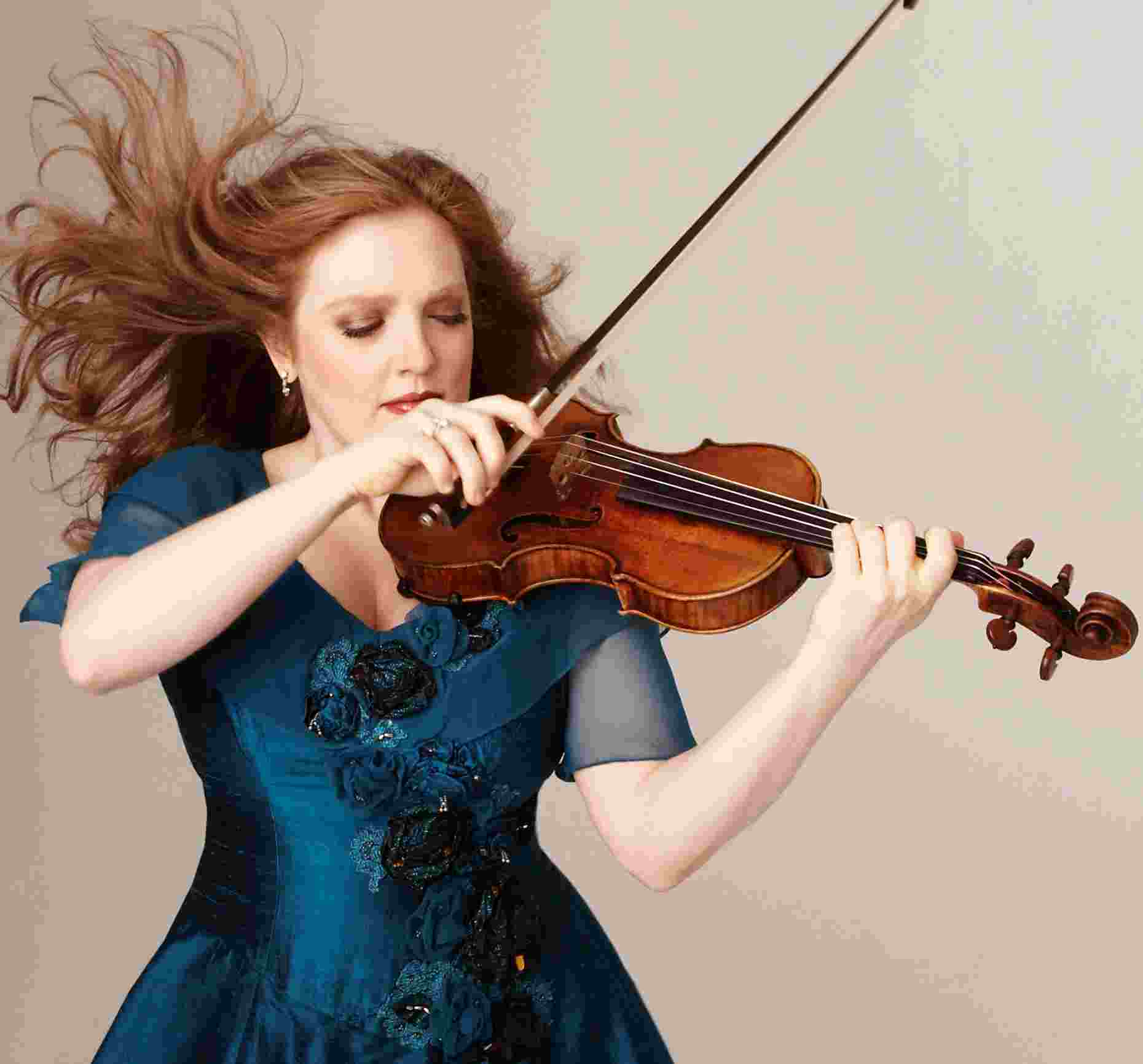
In
fact, collectively, the “Caprices” compiled a circus-like
variety of poignantly impressive playing techniques: ricochet
bowings and arpeggios followed by descending scales, double
and triple stops, bilding up and backward bowing, tricky staccatos
(such as in No. 10), plucking while simultaneously creating
high reaching notes that slither down to low ones, terrifying
trilling that demands fingers to perform like a contortionist
-- - and all this within a stunning array of harmonies and moods
of love (No. 21) and haunting tones (No. 6).
One
must conclude that Ms. Pine is this century’s “Paganina”
(albeit a much prettier version than the original namesake).
She not only gave us an evening of miraculous music, but she
engaged us by talking about the personality and instrumental
peccadillos of Paganini.
Another
of Ms. Pine’s gifts is her communicative zeal. Devoid
of any stagey pretention, she cajoled us with entertaining stories
about the 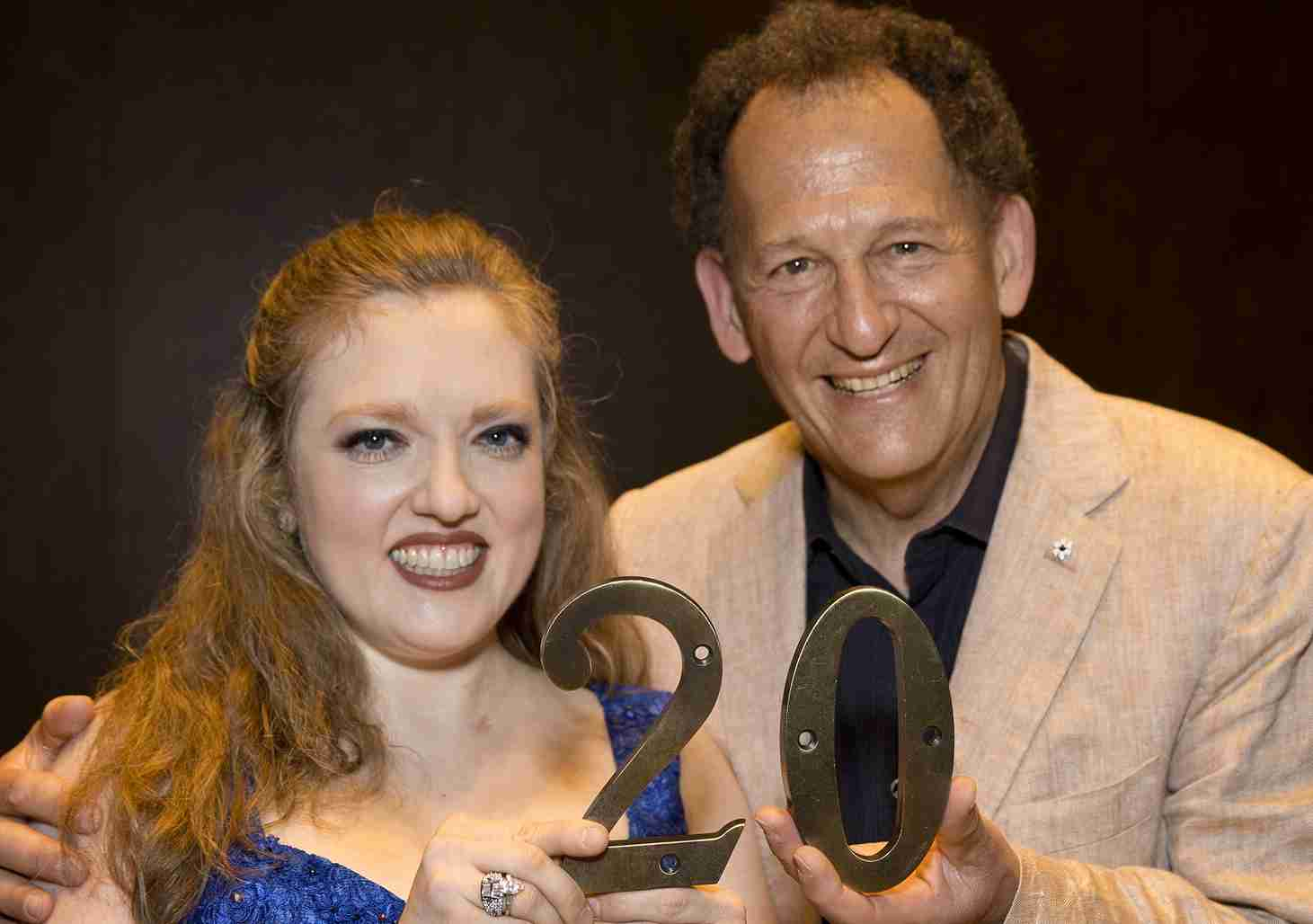 composer
and even included some humorous anecdotes about herself. She
spoke to us as if we were all at her party -- there to laugh
and relish the magic of Paganini’s music and the tricks
he employed to impress all. However, she had the final play;
she ended the 'party' with her own composition which celebrated
the 20th anniversary of Denis Brott’s brilliant Chamber
Music Festival.
composer
and even included some humorous anecdotes about herself. She
spoke to us as if we were all at her party -- there to laugh
and relish the magic of Paganini’s music and the tricks
he employed to impress all. However, she had the final play;
she ended the 'party' with her own composition which celebrated
the 20th anniversary of Denis Brott’s brilliant Chamber
Music Festival.
So
what did she do to send us on our way in spirited gaiety? She
composed several variations on the theme “Happy Birthday”
-- Paganini style.
What
a clever lady -- a virtuoso vixen playing on the priceless 'ex-Soldat'
Joseph Guarnerius del Gesù (Cremona 1742) violin picked
out by Brahms himself for one of his own students.
Ms.
Pine’s performance most surely would have put cocky Paganini
in his place had he been lucky enough to have heard it.
A
DYNAMIC CONCERT OF CONTRASTS PAYS TRIBUTE TO ISRAEL
June 10th, 8:00 p.m. Pollack Hall
It’
is the 20th anniversary of Denis Brott’s Montreal Chamber
Music Festival, and the following concert was a moving one –
a program to celebrate the resilience of man and how music unites
all cultures.
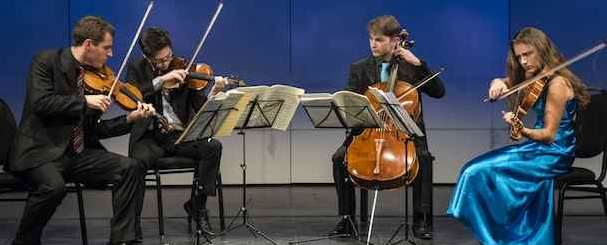
The
dynamic Dover Quartet filled the Hall with exuberance and spot-on
expressiveness in each piece they performed. Their timing was
impeccable. Indeed, it is not surprising this young ensemble,
which formed at the Curtis Institute in 2008 when its members
were only 19-years-old, has soared to reap prestigious awards
from the Banff International Strings Quartet Competition in
2013, along with a slew of coveted prizes, such as the Grand
prize of the 2010 Fischoff Competition.
The
first piece they performed was in memory of the Holocaust. Titled,
Quatuor. 3, opus 46, it was written by Viktor Ullmann
in 1942 during his internment at Theresienstadt. He was later
shipped off with his wife and murdered at Auschwitz. His words
move us to tears- as does his music. He said: “. . . All
that I would stress is that Theresienstadt has helped, not hindered
me in my musical work and that our desire for culture was matched
by our desire for life.”
Quatuor
3 vividly evokes a complex a relentless series of haunting
moods where despair, sadness and resignation reveal instrumental
angst, with bursts of hope and excitement interjecting the otherwise
painful motif in this work. The Dover Quartet captured the crescendos
and sensitive nuances with such polish and feeling.
March-André
Hamelin then appeared on stage to perform Schubert’s massively
difficult “Impromptus D, 935 nos. 3 & 4.” Never
have I seen a pianist stay so still as he performs. He is calm
and one surmises cerebral in his playing, and yet each note
each chromatic run, each trill, the octaves and more were perfect.
Compared to the Dover Quartet of whose passion was most visible,
one could say that Mr. 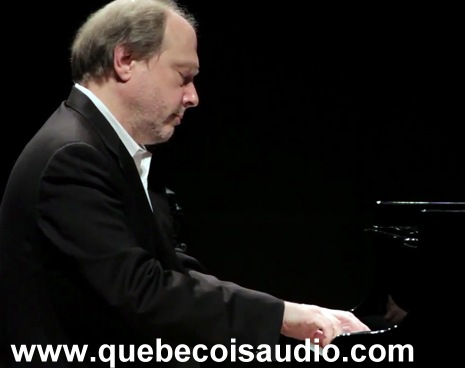 Hamelin
is a veritas veteran yoga master of his instrument. Never showy
or pretentious, he dashed off such fiery and fragile moments
of melody lines that left me breathless. Through the brilliance
of his technique via dexterity, alacrity, and strength –
all converged to create in this epic work the moods of sweetness,
delicacy as balletic tones and fanciful moments of trilling
and frolicking ascended and descended over the piano keys. I
was dumbfounded by his virtuoso playing; he made it all seem
as effortless as eating candy.
Hamelin
is a veritas veteran yoga master of his instrument. Never showy
or pretentious, he dashed off such fiery and fragile moments
of melody lines that left me breathless. Through the brilliance
of his technique via dexterity, alacrity, and strength –
all converged to create in this epic work the moods of sweetness,
delicacy as balletic tones and fanciful moments of trilling
and frolicking ascended and descended over the piano keys. I
was dumbfounded by his virtuoso playing; he made it all seem
as effortless as eating candy.
Finally,
Mr Hamelin and the Dover Quartet united forces to bring us the
most complex and emotional work on the program, Quintet
in F minor, by César Franck. It played out like
a love rhapsody. Full of turbulence, joy and tender moments,
this work was evidently inspired by one of Franck’s infatuations
with a student or possibly another composer, Augusta Holmès.
I found the work to be rich and moving as it evoked all the
stirring pulsations of love in our heart as it rises and falls.
It
was a faultless performance by the musicians who brought to
life Franck’s often unpredictable style where classical
structures collide into waves of romantic urgency.
The
artists’ complete understanding of each work and their
outstanding ability to carry off such beautiful music demonstrated
supreme musicianship and mastery over their instruments.
For
the upcoming concert information and ticket reservation, call
(514) 489-7444 or visit: wwww.festivalmontreal.org